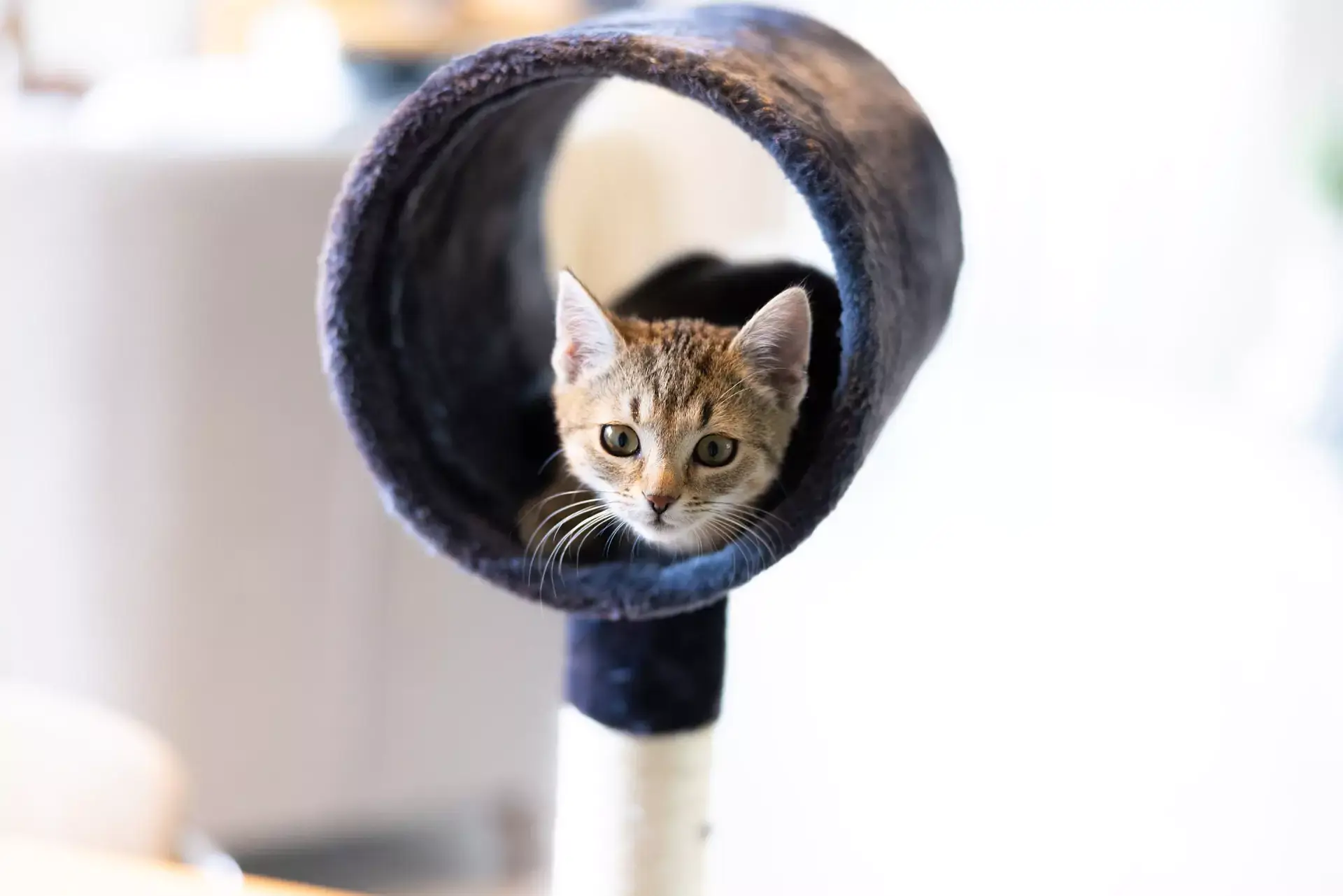Cats have been our companions for over 12,000 years, yet they remain enigmatic creatures. One well-known fact about these mysterious animals is that they often hide signs of illness, making it crucial for owners to recognize subtle changes in their behavior. Understanding the signs of sickness in cats can be life-saving, as early detection of symptoms like vomiting, lethargy, or changes in appetite can lead to prompt veterinary care. Discover how to spot these warning signs and ensure your feline friend stays healthy and happy.
Kitties are certainly very mysterious. We’ve been friends with Fluffy for a long time—perhaps as much as 12,000 years. While we’ve learned quite a lot about our feline friends, there are still quite a few things we may never quite figure out, such as why they sometimes make clicking noises when they see birds, why they are obsessed with boxes, or why they are always so tired. One thing that we do know is that these cute little balls of fur can be quite secretive when it comes to letting on that they are sick. You may need to pay close attention to spot some of the warning signs. A local Grange Hill East, ON veterinarian answers some common questions on this below.
How Do Cats Act When They Are Sick?
Our feline pals are all very unique. (Actually, that’s a bit of an understatement.) Every cat is a bit different. You’ll want to pay attention to any behavior that just seems out of character for your kitty. For example, it may be perfectly normal for a shy kitty to hide a lot. Fluffy may also hightail it for her favorite hiding spot if someone brings a dog over or drops a kitchen pan. However, if your feline pal is normally friendly and outgoing, but suddenly starts to act withdrawn, there could be something going on.
Here are a few more examples:
- A vocal kitty that suddenly stops meowing
- A quiet cat that starts yowling
- An aloof cat that starts begging for attention
- A cuddly cat that suddenly doesn’t want to be touched
- A friendly cat that starts acting grumpy/aggressive
The better you get to know Fluffy, the easier it will be to spot these changes. Pay lots of attention to your kitty!
What Are Some Common Illnesses For Cats?
Kitties are typically quite hardy, but they aren’t quite as invincible as they seem to think. Fluffy is actually vulnerable to a whole slew of illness and disease.
Here are some of the common ones:
- Diabetes
- Feline immunodeficiency
- FeLV
- Upper respiratory tract infection
- Cancer
- Kidney disease
- Hyperthyroidism
- Tapeworms
- Fleas
- Obesity
- Ringworm
- Dental disease
- Eye problems
- Feline infectious peritonitis
- Feline panleukopenia
- Heartworm
- Lower urinary tract disorders
- Rabies
- Abscesses
- Intestinal parasites
- Lymphoma
- Pancreatitis
- Urinary infections
- Gastrointestinal issues
Keeping up with your kitty’s preventative and wellness care can go a long way toward protecting her from many illnesses. Some issues aren’t necessarily preventable, but can often be managed with treatment. Of course, the sooner a problem is found and diagnosed, the better.
Why Do Cats Hide Signs Of Sickness?
As you may know, our feline pals can be a bit tricky here. They often try to hide signs that they are ill. This is actually a pretty deeply-ingrained survival instinct. In the wild, predators are always on the lookout for animals that appear weak or sick, as they can make easy targets. Fluffy learned long ago that showing signs of illness can attract unwanted attention from predators.
What Are Some Of The Signs Of Sickness In Cats?
Without further adieu, here are some of the most common things to watch for:
Vomiting
It’s usually not a huge concern if Fluffy throws up every now and then. Many of our feline pals get the occasional hairball. However, frequent vomiting is a definite concern. Dry heaving, bloody or frothy vomit, and any other type of unusual vomiting is also an issue.
Loss of Appetite
Kitties can be finicky, but if Fluffy just doesn’t like what you put in her bowl, she should meow to demand something else. A complete lack of interest in food is a red flag.
Increased Appetite
On the other paw, a sudden increase in appetite can also be a concern. Our feline pals do tend to be pretty enthusiastic about food, but if your feline friend suddenly seems like a bottomless pit, there could be something going on, such as hyperthyroidism, for instance.
Diarrhea
Diarrhea is one of the few warning signs that is concerning in nearly all of our animal friends, regardless of what age they are. This can be indicative of a variety of issues, from parasites to inflammation to other problems. It can also quickly lead to dehydration. Constipation is also a concern, but it may be harder to spot, especially if your furry friend’s litterbox is in a private area.
Lethargy
While some kitties may seem to opt for lethargy as a life goal, even the sleepiest kitty should be alert and awake at least a few times a day. If Fluffy just doesn’t seem to have any energy, there may be something wrong.
Increased Thirst
Excessive thirst can be indicative of many things, from diabetes to kidney disease. It is important to make sure Fluffy always has fresh water. Just keep an eye on how much she’s drinking. Filling her bowls at the same times each day can help with this.
Respiratory Issues
Gasping, coughing, wheezing, rapid breathing, shortness of breath, and raspy breathing are all red flags. These may call for emergency care, especially if the issue comes on rapidly.
Discharge
The occasional eye ‘booger’ usually isn’t a cause for concern, but excessive, goopy, or discolored discharge from the eyes is a different story. A runny nose is also not normal for kitties, and can be a sign of respiratory disease. Discharge from the ears is also a cause for concern.
Skin/Coat Problems
It’s not uncommon for older cats to look a bit unkempt. Seniors often have a hard time grooming themselves, just because they tend to get stiff and sore. However, most kitties are pretty good about keeping up with this. If your kitty’s fur looks very dull, or if you notice things like redness, flaking, lesions, or bald spots, contact your vet right away.
Changes In Vocalization/Behavior
One of the best things about cats is the fact that they are so chatty and talkative. Keep an eye (or ear) out for changes in your furry friend’s usual vocalizations. If Fluffy is normally quiet, but suddenly won’t stop meowing, she could be trying to signal pain. A kitty that is usually quite talkative, but suddenly acts withdrawn and quiet, may also not be feeling well.
Bad Breath
Fluffy’s breath probably will never smell minty-fresh, but it shouldn’t be completely rank, either. This can be a sign of dental issues, and can also sometimes be symptomatic of internal problems.
Litterbox Woes
Cleaning your furry buddy’s litterbox will never be the best part of having a cat, but it is necessary. Pay attention to what you find in Fluffy’s powder room. Changes in the color, texture, smell, or amount of your cat’s waste can all signal health issues. If you notice your cat straining to go, contact your vet immediately: this can be a sign of blockages, which are extremely dangerous.
Weight Changes
Our feline pals are quite small, so even a gain or loss of a pound or two can signal major health issues. Pay attention to your pet’s weight!
Visible Signs Of Trauma
Sometimes, it’s quite obvious that something is wrong. Things like limping, fever, wounds, lesions, and swelling are a few more examples of things that should be addressed immediately.
If you notice any of these warning signs, or any other indication that your kitty isn’t feeling well, contact us, your local Grange Hill East, ON pet hospital, today!
Critical Signs of Sickness in Cats in 2025
How long can a cat go without eating before it becomes a serious concern?
Cats can typically survive for about two weeks without food as long as they have access to water. However, it’s crucial not to wait this long if a cat stops eating. After just 48 hours without food, cats can begin to develop hepatic lipidosis, or fatty liver disease, a potentially fatal condition. Immediate veterinary attention is recommended if a cat shows a decreased appetite or ceases eating entirely, to prevent serious complications and address underlying health issues.
What eye changes might indicate illness in cats?
Eye changes in cats can signal various health issues. While occasional eye discharge is normal, excessive, goopy, or discolored discharge suggests a problem. Additionally, a runny nose paired with eye issues could indicate respiratory disease. Discharge from the ears also warrants attention. Redness, cloudiness, or any noticeable change in the eyes’ appearance can be signs of underlying conditions. If a cat’s eyes appear dull or if there are visible lesions, it is important to seek veterinary care immediately. These changes might point to infections, allergies, or more serious conditions requiring prompt treatment.
What are the signs of urinary tract problems in cats?
Signs of urinary tract problems in cats include frequent attempts to urinate with little or no urine output, straining or crying during urination, blood in the urine, urinating outside the litter box, and excessive licking of the genital area. Cats may also show signs of pain, such as restlessness or vocalization, and their urine may have a strong odor. Behavioral changes like increased aggression or withdrawal can also occur. These symptoms can indicate serious issues like urinary tract infections, blockages, or inflammation, requiring prompt veterinary attention.
How can I tell if my cat is experiencing breathing difficulties?
Recognizing breathing difficulties in cats is crucial. Signs to watch for include gasping, coughing, wheezing, rapid breathing, shortness of breath, and raspy breathing. These symptoms can indicate serious conditions like respiratory infections or heart disease. If these issues appear suddenly, seek emergency care. Monitoring your cat’s normal behavior can help identify changes. Ensuring your feline has fresh water and observing any increase in thirst can also be helpful, as dehydration can exacerbate breathing problems. Always consult your vet if you notice any of these signs.
How often should I take my cat for wellness examinations?
Cats should generally be taken for wellness examinations at least once a year. Regular check-ups are essential for monitoring your cat’s health and detecting any potential issues early. Annual visits allow veterinarians to perform physical exams, update vaccinations, and provide preventive care. For senior cats or those with chronic conditions, more frequent visits, such as biannually, may be necessary. Keeping up with regular vet visits can help ensure your cat stays healthy and can address any emerging health concerns promptly. Always consult your veterinarian for personalized recommendations based on your cat’s specific needs.
Do you have questions about your kitty’s health or care? Contact us, your local Grange Hill East, ON pet hospital, anytime. We are dedicated to offering great care.






!Social Media Icons